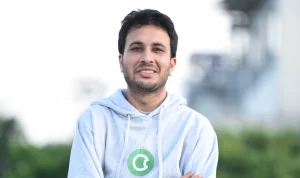Harsh Pokharna’s Story of Financial Insecurity After Securing ₹120 Crore
In a world where raising millions in funding often signifies a startup’s success, an IIT – Harsh Pokharna graduate’s experience reveals the uncomfortable truth behind startup funding and the financial pressures many entrepreneurs face. Harsh Pokharna, the founder and CEO of OkCredit, found himself unable to afford rent in Bengaluru despite securing ₹120 crore in Series A funding in 2019. His story sheds light on the often overlooked financial struggles faced by startup founders, even those who seem to have it all on the surface.

The Paradox of Startup Wealth
In his candid LinkedIn post, Harsh Pokharna shared a personal story of financial insecurity that many other founders can relate to. Despite his company’s impressive Series A raise, Harsh was broke, living paycheck to paycheck, with no savings to his name. The idea that someone with millions in funding could still face financial hardship is a paradox that many entrepreneurs grapple with but rarely talk about.
Many people view a startup’s fundraising milestone as a sign of success, but the reality is often very different for founders. The funding doesn’t immediately translate into personal financial stability. In fact, for many entrepreneurs, it means they continue to live a life of financial insecurity. In Harsh’s case, it wasn’t the rent prices or a greedy landlord that made it difficult for him to pay his bills; it was the systemic nature of venture capital.
The Systemic Problem: Venture Capitalists’ Control
Harsh highlighted a disturbing but common practice in the venture capital world. Venture capitalists (VCs) often prefer founders to remain financially strained. According to Harsh, a founder with no money is easier to control, as they are more likely to comply with investors’ wishes, remain “hungry,” and continue to work tirelessly to secure the company’s future. This practice is often justified by the notion that financial pressure breeds innovation, but Harsh Pokharna argues that it only serves to maintain control over the entrepreneur, keeping them tethered to the investors’ agenda.
The myth that financial struggle leads to better productivity is ingrained in the startup world. In reality, Harsh Pokharna believes that having personal financial stability can make a huge difference in a founder’s ability to think clearly, make decisions independently, and take bolder risks. The notion that personal wealth dulls a founder’s drive is a fallacy that needs to be challenged.
A Founder’s Need for Personal Liquidity
One of the most striking parts of Harsh Pokharna’s post was his discussion on personal liquidity. When startup founders ask for modest personal liquidity to pay off debts or gain financial breathing room, they often face resistance from VCs. The narrative is that personal wealth might dampen a founder’s ambition. This, however, contradicts the reality of serial entrepreneurs who are already financially secure and continue to attract funding.
Harsh Pokharna emphasized the double standard in the startup world. VCs often fund serial entrepreneurs who have established financial security, owning beach houses and retirement portfolios. Yet, the same VCs resist offering financial security to first-time founders who are struggling to pay their bills. Harsh argues that this narrative is harmful and doesn’t align with the reality of what it takes to build a successful startup.
